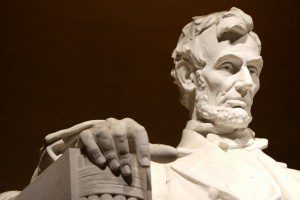Last Sunday I preached atthe Pacific Unitarian Church on pilgrimage as a spiritual practice. I mentioned that pilgrimage is an ancient human thing that is not only overtly religious but can be found in other aspects of our many cultures. As an illustration of a non-religious sort of pilgrimage I cited my recent visit with my spouse to Washington D.C. For Jan, as a librarian, I think our tour of the Library of Congress had spiritual elements. And for both of us the tour of the White House arranged by our congressman included elements of what I think marks pilgrimage.
But actually my most powerful experience of civic religious pilgrimage took place some years ago on another visit to our nation’s capital. At that time we visited the Lincoln Memorial. For me there are few places where the spirituality at the heart of our nation’s aspiration is more on display than at that Greek Doric temple housing that statue. Inside on the wall behind that statue is inscribed “In this temple, as in the hearts of the people for whom he saved the Union, the memory of Abraham Lincoln is enshrined forever.” For me there are only a handful of other sites quite so evocative of what is hopeful about our American project. As I type these words only the Statue of Liberty comes immediately to mind.
As it happens today, in 1863, at the dedication of a military cemetery outside of Gettysburg, Pennsylvania, Abraham Lincoln gave an address. It wasn’t highly thought of at the time. The president wasn’t even the principal speaker, that honor went to the renowned Unitarian divine, educator, and former governor of Massachusetts, Edward Everett, who delivered a two hour spectacular.
While the general public seemed to have missed the import of the president’s brief remarks at the time, that was not so for the Reverend Everett, who told the president “I should be glad if I could flatter myself that I came as near to the central idea of the occasion, in two hours, as you did in two minutes.”
For me there are two documents that lay out what I think of as the justification for the American project, and which I wish we would call ourselves back to on a regular basis. The one is the Declaration of Independence. The other is the Gettysburg address. Everything else is commentary.
In the run up to our current presidential elections I think of the crowd of candidates for Abraham Lincoln’s party, I feel waves of shame that these people who range from holding distasteful ideas of governing policy for our country to, and this includes the majority the worst sort of hateful demagogues spewing poison into the ears of the people, would aspire to that office and be serious contenders. I even fear for the republic and its higher ideals. At times like this I need some sense we are about something more than the short term, grasping, and hatred of the weak and powerless.
And then I see that it was on this day in 1863 that Abraham spoke.
The time Jan and I made our way to the Memorial, that was a pilgrimage. We stood outside, and gazed up. We climbed the stairs and looked out across the Mall at the majesty of the capital, turned and looked at that amazing sad and powerful statue. And, then read the words carved into the walls, that sweet and powerful document that was Lincoln’s second inaugural address, and certainly counts among the great documents of the republic, and then the address itself.
There religion and politics do come together, there the sense of religion as that which gives life and the hope of a civic life, of a gathering of people dedicated to human possibility stand without a hairsbreadth of distance.
And as I think about it, I feel that frisson of hope I so desperately, we so desperately need.













